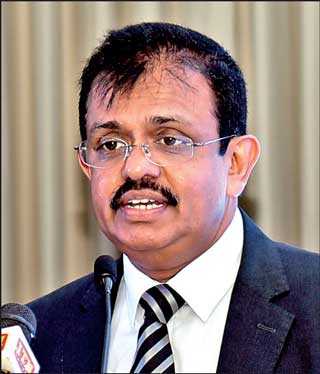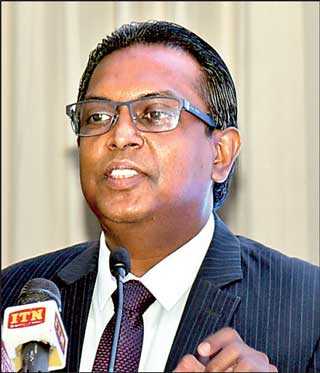Saturday Feb 21, 2026
Saturday Feb 21, 2026
Wednesday, 1 July 2020 00:00 - - {{hitsCtrl.values.hits}}


By Uditha Jayasinghe
In an effort to increase cashless transactions, LankaClear yesterday launched two new initiatives, the Payment Exchange Name (PEN) and Direct Debit Authorisation (DDA), to encourage the public to
 |
Central Bank Payments and Settlements Director D. Kumaratunge |
 |
LankaClear GM-CEO Channa De Silva |
continue online transfers that grew exponentially during COVID-19 curfew.
PEN is for real-time payment system facilitated via LankaPay Common Electronic Fund Transfer Switch. Essentially PEN allows customers to make payments by assigning a nickname to each account held by the customer, and linking it with their mobile number. LankaClear CEO Channa de Silva explained that this means customers do not have to remember the branch name, branch and account number of the people they are making payments to.“PEN will simplify online statements and make them accessible to less tech-savvy people. There is no longer need to maintain numerous profiles for different people. Customers of PEN member banks can select the phone number and the respective PEN to complete transfers. No sensitive information will be transferred via the PEN and so the system is completely secure,” he said.
National Savings Bank and Sampath Bank have already adopted the PEN system and LankaClear was confident that more banks will adopt the technology in the near future.
DDA is an extension of the LankaPay CEFTS, and is expected to replace standing orders and making it easier for companies in their payment collection activities. Banks, insurance, leasing and utility companies are expected to find this mechanism useful as they have to collect regular payments. This method is widely used in other countries, de Silva noted.
Citizens Development Business Finance PLC, Commercial Leasing and Finance Ltd., Deutsche Bank, LOLC Finance, People’s Bank, National Savings Bank, Seylan Bank and Standard Chartered Bank are among those who have already adopted this technology with other companies expected to follow soon.
“One of the biggest challenges to getting Sri Lankans to adapt to online transactions is because there is an abundance of bank branches and ATMs in most parts of our country. In other countries banking penetration is much lower and so people have no choice but to adapt to digital money transfers. However, due to the curfew imposed to control COVID-19 people increased their online transactions by as much as 85-90% and we are hopeful this will continue. Banks are also investing in new digital platforms but there needs to be more awareness creation so people will join and use these new technologies,” Central Bank Payments and Settlements Director D. Kumaratunge said.
Pix by Ruwan Walpola